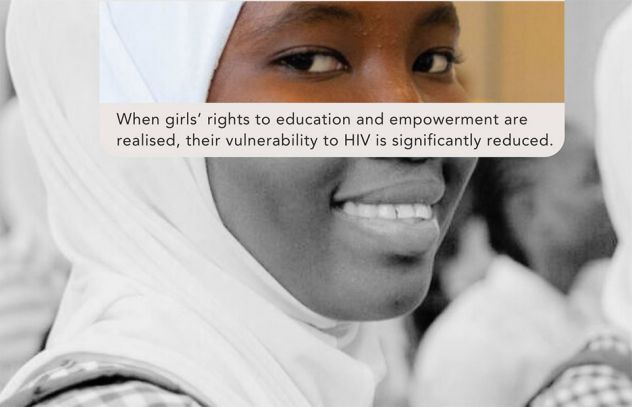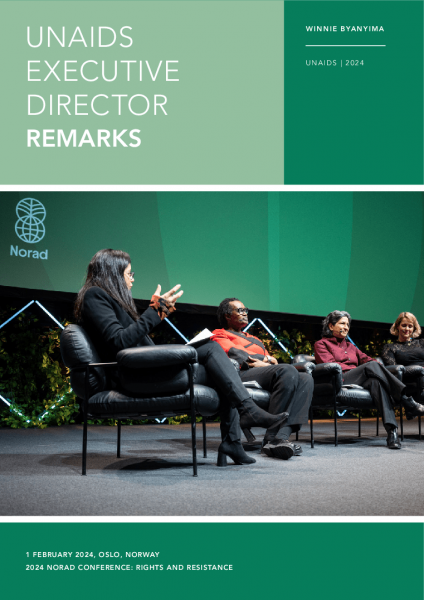OSLO/GENEVA, 1 February 2024—At a conference hosted in Oslo by the Norwegian Agency for Development Cooperation (Norad), UNAIDS Executive Director, Winnie Byanyima, has made an impassioned call to all international partners to support women and girls from marginalized communities at the frontlines of the defence of human rights. Only by ensuring that the rights of everyone are protected can the world ensure that the health of everyone is protected, and that the Sustainable Development Goals are achieved.
In her keynote speech at the Rights and Resistance conference Ms Byanyima said, “We cannot separate sustainable development from human rights. We must put human rights at the centre of our development efforts. The AIDS movement, of which I am proud to be part, has been resolute in this. We have demonstrated how patriarchal, racist, and homophobic laws, policies, practices and norms undermine health and hurt everyone.”
She said that progress was in peril from a backlash on human rights but that hard-won gains could be protected and expanded by doing three things:
- Deepening our understanding of the pushback on human rights and democracy
- Bringing our efforts together and connecting the dots to link the struggles, thinking long term and being bold
- Backing and resourcing the people most impacted by the attacks on rights—foremost by supporting women and girls from the poorest and most marginalized communities
In her speech, Ms Byanyima underlined some of the gains made by human rights defenders in recent years through the leadership of women and girls and LGBTQ communities.
- 50 million more girls are in school than were in 2015
- Whereas a few decades ago, two-thirds of countries criminalised same-sex relationships, today two-thirds of countries do not criminalise them.
Opening the conference, Norway’s International Development Minister, Anne Beathe Tvinnereim, said, “We have an obligation to back those who risk their lives fighting for values that we take for granted. Norway will continue aiding those actors on the ground who stress the universality of human rights. We will support free and independent media, including at the local level. Finally, all Norwegian development aid shall be rights-based."
Human rights violations continue to drive the HIV epidemic among women and girls. Every week, 4000 adolescent girls and young women aged 15—24 became infected with HIV globally in 2022. 3100 of these infections occurred in sub-Saharah Africa.
Upholding the rights of marginalized communities is vital for enabling success in the HIV response. When marginalized communities are criminalized or stigmatized, their vulnerability to HIV infection increases, and their access to HIV prevention, treatment, care, and support services is obstructed. UNAIDS research shows that the decriminalization of same-sex relationships is a crucial step in ending the AIDS pandemic.
UNAIDS is highlighting that the recent, well-coordinated and well-funded global pushback against women’s rights, against the human rights of LGBTQ people, against sexual and reproductive health and rights, against democracy and against civic space is not only a threat to everyone’s freedom, it is a threat to everyone’s health. In response to this threat, the AIDS movement and its allies are pushing back against the pushback, reminding world leaders of their commitments to uphold all human rights for all people.
UNAIDS is supporting frontline human rights defenders in both crisis response and in the longer-term work and is helping to expand support for human rights by demonstrating that laws, policies and practices which uphold human rights help countries to ensure public health and to get on track to end AIDS.
The UNAIDS Executive Director expressed confidence that the advancement of rights can be won. “Progress is not automatic. But if we are courageous and united, progress is possible,” said Ms Byanyima.
The full version of Ms. Byanyima’s speech (delivered at 12:50 CET February 1) can be viewed here.
UNAIDS
The Joint United Nations Programme on HIV/AIDS (UNAIDS) leads and inspires the world to achieve its shared vision of zero new HIV infections, zero discrimination and zero AIDS-related deaths. UNAIDS unites the efforts of 11 UN organizations—UNHCR, UNICEF, WFP, UNDP, UNFPA, UNODC, UN Women, ILO, UNESCO, WHO and the World Bank—and works closely with global and national partners towards ending the AIDS epidemic by 2030 as part of the Sustainable Development Goals. Learn more at unaids.org and connect with us on Facebook, Twitter, Instagram and YouTube.




